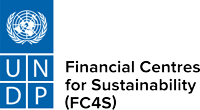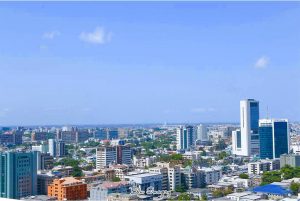The UN Environment convened Financial Centers for Sustainability (FC4S) Network has today published a report which has for the first time measured the contribution of financial centres to sustainable development and the ongoing low-carbon transition.The 2019 State of Play report also identifies key challenges facing this growing sector.
Over the past three years, sustainable finance has become a mainstream aspect of financial market growth and innovation around the world – as evinced by growth in issuance of green bonds, proliferation of sustainable investment products, increasing volume of assets managed according to increasingly stringent sustainability criteria, new green banking and insurance offerings, and a step-change in disclosure and reporting of environmental information – including climate risks.
Established in September 2017, the FC4S Network provides a platform for financial centres to exchange experience and develop practical collaboration for the growth of green and sustainable finance. As of March 2019, the Network has seen a doubling in membership since its launch, attracting 22 financial centers as members from across Europe, Asia, Africa, and North America.
In 2018, supported by EU EIT Climate-KIC the FC4S Network established an Assessment Programme to track the progress of financial centre efforts to support the expansion of green and sustainable finance markets, and explore different ways of measuring the contribution of financial centres to sustainable development and the low-carbon transition.
The FC4S report findings were released in Brussels today during the European Commission’s High-Level Conference on Sustainable Finance, a key gathering of over 600 political, regulatory, policy and market actors to celebrate the one-year launch anniversary of the EU’s Action Plan for Financing Sustainable Growth.
Commenting, FC4S co-chair Pierre Ducret, Board member Paris Finance for Tomorrow, said: This report illustrates that financial centres have a critical role to play in accelerating the transition towards a sustainable financial system. FC4S is committed to helping them by supporting and assessing their initiatives and achievements, measuring their progress, and mobilising necessary skillsets. The network will also contribute to connect actions in Financial centres with global policy initiatives, such as that led by the European Commission.”
Results of the pilot Assessment Programme survey illustrate that:
New forms of public private partnership: Nearly two-thirds of financial centre initiatives on green and sustainable finance are partnerships between the private and public sectors, giving them unique ability to link policy and practice.
There are material barriers to growth: The top three barriers faced by financial centres are i) a lack of green financial products, ii) inconsistent standards and iii) insufficient market demand. Lack of a shared language for green and sustainable finance is a key constraint, highlighting the need for continued dialogue between public and private stakeholders on taxonomies.
Financial centres are going beyond climate: Climate change continues to be a major focus for activities branded as “sustainable” but FC4S members recognize need to broaden their offering to include other environmental priorities (e.g. circular economy, natural capital and conservation finance) as well as social themes, such as financial inclusion and social impact investing
Policy innovation is a key driver: New policy initiatives and action by financial regulators and supervisors is a key driver in half the financial centres, with system-wide initiatives and debt capital markets the most cited examples. In a quarter of centres, policy and regulation is touching upon equity and debt capital markets, insurance, investment, banking and system-wide action.
New instruments are proliferating: Over 75% of financial centres noted the presence of different debt instruments related to green and/or sustainable finance – primarily green bonds. Equity instruments are on the rise, with 25 % of respondents noting the presence of structured products, closed ended funds, and discretionary mandates.
Progress varies across sectors: Investment and asset management is the most mature sector with respect to green and sustainable finance in most centres, while green banking is evolving, and insurance has the furthest to go.
Professional services are growing rapidly: Over 75% of respondents acknowledged the presence of sustainable rating services and consulting firms; other services (sustainability research, labelling, legal, clean techs and carbon trading) are present in select financial centres.
Shared priorities for Future Action: Leading financial centres have identified further product development, improved data collection and better market standards as top priorities for further development.
Focus on Innovation: Applying financial technology (fintech) solutions to sustainable finance challenges is a major focus for financial centres, with several FC4S members establishing specific projects aimed at fostering innovation – including accelerator programmes.
Increasing international collaboration: FC4S member centres are working more closely together on sustainable finance, including through bilateral projects. More and more centres are seeking to join the FC4S Network to benefit from collaboration opportunities.
Commenting, FC4S co-chair Kong Wei, Convener, Shanghai Lujiazui Financial City Green Finance Development Committee, said: “This assessment provides highly valuable insights into the scale and purpose of sustainable and green finance activity in our member’s centres. There have been tremendously positive strides taken but much remains to be done. This year the FC4S Network will revise the Assessment Programme methodology to target more complex and diversified questions relating to green and sustainable finance – and start to build the necessary data history to measure progress over time.”
Valdis Dombrovskis, Vice President European Commission, said: “Global financial centres can help scale up sustainable finance and mobilise international investors towards sustainable investments across the globe. I welcome the first report of the UN Financial Centres For Sustainability (FC4S) Network, which for the first time assesses the contribution of financial centres to sustainable development. We need to build global cooperation to coordinate an international approach to sustainable finance that avoids fragmentation and greenwashing.”










































